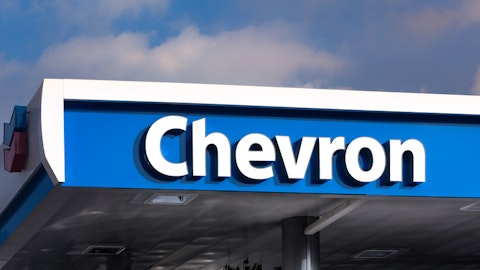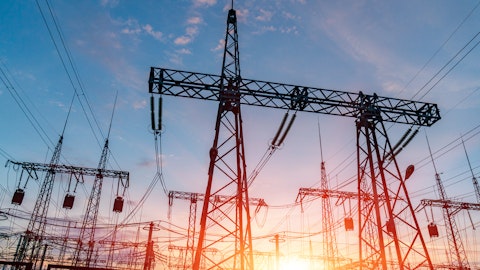Operator: The next question is from the line of Jeremy Tonet with JPMorgan.
Jeremy Tonet: I just want to round out the Commercial Renewables conversation a little bit, if I could. If there’s any additional color you could provide on the sale such as where book value stands right now, portfolio tax equity position, asset level debt. Just trying to fuse together more on our side. I appreciate that it’s a sensitive time given that you’re selling the assets, but wondering if you could share any more details, particularly as it relates to book value.
Lynn Good: Yes. And Jeremy, let me comment on — we feel good about the process, strong interest in the portfolio. We’re not going to talk any more specifically around valuation. I hope you can appreciate that given where we are in the process. And I don’t know, Brian, if you want to add anything to…
Brian Savoy: Yes. Jeremy, we referenced a $3 billion book value excluding the tax attributes mid-year and we had some projects we continue to invest in for the balance of the year and then took the $1.3 million write-down at the end of the year. So you can kind of walk it down that way if you want to think about book value.
Jeremy Tonet: Got it. That’s helpful. And then I just wanted to kind of pivot a little bit, you involved with a number of emerging technology partnerships, including Honeywell battery, and TerraPower hydrogen pilot. Just wondering which technology here you’re most excited about? And if you were going to move forward 10, 20 years down the road, which one do you think plays a larger part in the Duke portfolio at that time?
Lynn Good: Jeremy, it’s a really good question. It’s a really good question. And one of the reasons we are involved in so many different things is the obstacle for full-scale adoption has a lot to do with which technology can reach commercial scale with a supply chain that will support how much of it we need. I think about our path or climate report through 2050 has us a need of somewhere between 10,000 and 15,000 megawatts of what we call 0 emitting load following resources kind of in that late . So that could be hydrogen. It could be small modular reactors. It could be CCUS, it could be longer duration storage. So the key being, again, though, we’re not going to invest until they’re affordable for our customers, and we can invest at the commercial scale necessary to make a difference.
The small module reactor is something we’re spending time on, and you would expect us to. We are the largest regulated nuclear operator in the U.S. sitting in a part of the world that embraces nuclear as part of the solution. But we also joined with a collection of Southeastern utilities to pursue a hydrogen hub. Because with all that carbon-free generation and all the solar we’re going to have in this area, we think that’s something worth investing in, really, as part of maintaining and preserving the natural gas infrastructure that has been so important to this region. So I know it’s a roundabout answer to the question, but we’re not ready to put our finger on any specific technology as the solution, but we are advancing our work, piloting, advising, working as actively as we can to make sure these technologies are developing at pace so that when we do need them and are ready to invest, there will be something that makes sense for our customers.
Operator: The next question is from the line of Durgesh Chopra with Evercore ISI.
Durgesh Chopra: Just all my other questions have been answered. If I may, I just had a quick clarification on the tax leakage portion of the commercial renewables sale, Brian, does — so the message on the Q3 call was tax leakage is manageable given your other tax losses. I’m thinking about with this write-down, does that impact your sort of tax basis? And are you still saying that — is the message still that the tax leakage is manageable? Or does that — does the impairment charge change that dynamic?
Brian Savoy: Yes. There’s no change to the tax position or a tax basis as a result of this impairment charge, so no change in message. We can manage it.
Operator: Thank you. That’s all the time we have for questions today. I would like to turn the call back over to Lynn Good for concluding remarks.
Lynn Good: Well, thank you all for joining and for your investment in Duke Energy. We appreciate that. We feel like we’ve had a strong finish to the year and excited about 2023. And as always, we’re available, Investor Relations and the senior management team for any further questions. So thanks for joining today.
Operator: That concludes today’s conference call. Thank you for your participation. Please enjoy the rest of your day.
Follow Duke Energy Corp (NYSE:DUK)
Follow Duke Energy Corp (NYSE:DUK)
Receive real-time insider trading and news alerts





